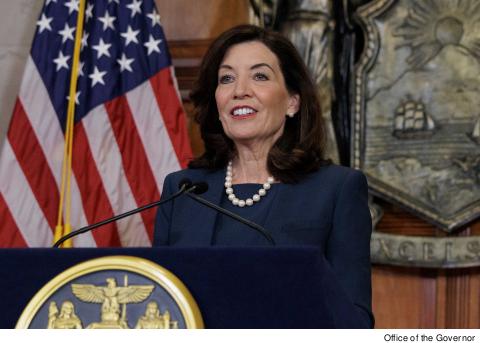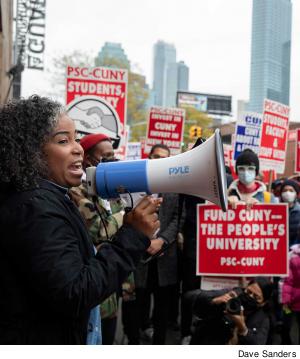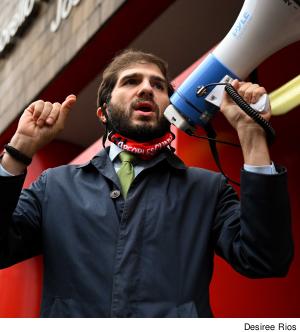A good starting position
 |
In Governor Kathy Hochul’s Executive Budget for the 2023 fiscal year, she makes clear she is not the kind of penny-pinching, anti-public-sector executive her predecessor was. The governor’s proposal presents an opportunity for the PSC as the union engages in the spring’s state budget negotiations and a difficult fight to secure funding for a just, collective bargaining agreement with CUNY.
Governor Hochul unveiled her budget proposal in January, the first step in a monthslong budget negotiation process with the legislature. Under the New York State Constitution, the Executive Budget must be approved no later than April 1. At this stage in the process, the PSC usually braces for flat budget proposals for CUNY – or worse, devastating cuts to a university system that has been chronically underfunded for decades. Former Governor Andrew Cuomo, who resigned last year, was notorious for starting the year off with a declaration of austerity funding to undercut unions and public agencies.
SOME INCREASES
Hochul’s budget proposal did not fully fund New Deal for CUNY legislation, but she did offer funding increases that put the union in a better negotiating position than any in recent memory.
“Governor Hochul has announced a combined $1.5 billion increase in operating support for CUNY and SUNY over the next five years, including an additional $170 million for CUNY senior colleges next year.… It’s heartening to see that Governor Hochul is acting decisively to begin reversing the years of austerity funding for CUNY, New York’s most powerful force for economic mobility for low-income New Yorkers, immigrants and students of color,” the union said in a statement.
“We thank the governor for her proposed senior college funding increase, made without increasing tuition, and her plan to hold community college funding harmless against temporary COVID-related enrollment losses. We are also encouraged by the governor’s plans to expand campus childcare and reform the Tuition Assistance Program (TAP),” the statement continued.
“After many years of disinvestment, CUNY needs this increased state funding and we look forward to reviewing the budget in detail. CUNY identified $313 million in needed investments in its University Budget Request, and our students need additional full-time mental health counselors and academic advisors. PSC members are ready to work with the governor and the legislature to further increase the state’s investment in CUNY and to enact the New Deal for CUNY legislation so that the public college students of New York City can have the free, fully-funded, high-quality education that they deserve.”
In the governor’s Executive Budget Briefing Book, she “provides SUNY and CUNY with $106 million – $53 million each – to hire additional full-time faculty at both four-year colleges and community colleges. This investment will fund an estimated 880 additional full-time faculty – 340 at SUNY and 540 at CUNY, including support for CUNY’s plan to convert adjuncts to full-time faculty.”
The union embraced the additional funding proposed, but it will continue to push for elements of the New Deal for CUNY, including the hiring of more academic advisors and mental health counselors. Student activists and the union have repeatedly testified before the New York City Council this past year on CUNY’s mental health staffing levels, which, in proportion to the student body, average much lower than those at national colleges across the country.
 |
BREAK FROM THE PAST
In general, Hochul’s budget proposal departs sharply from the austerity proposals often made by her predecessor. That’s a positive sign for those committed to greater public investment as she campaigns for a full term as governor in the primary and general elections later this year. The fact that the editorial board of the New York Post hates Hochul’s budget proposal is a testament to how much it deviates from the austerity program that has steered Albany for the last decade. The Post’s loss can be construed as a gain for union members, working people and public institutions throughout the state.
The New York Times noted that Hochul offered “a record-high proposal that is about $4.3 billion larger than the budget approved last year,” and that she “finds herself in the politically enviable position of leading a state in good financial health, boosted by a rebound in tax revenues, including $5 billion more than originally expected in annual receipts over the next four years.”
The Times noted that her budget director, Robert Mujica, who is also a member of the CUNY Board of Trustees, said this was “the first time that the state’s budget division had published a financial plan with no budget gaps in any year; previous governors typically forecast billions of dollars in deficits in years ahead.”
Luke Elliott-Negri, the PSC legislative representative, told Clarion, “The governor made a political commitment of $1.5 billion to CUNY and SUNY over the next five years, including money for new full-time faculty, to close the TAP gap and hold community colleges harmless this year. It is a distinctly favorable environment in which to engage the legislature to pass the New Deal for CUNY now, which is precisely what we must do across this whole union between now and April 1.”
ADJUNCT JUSTICE
One major goal of the PSC in the long-term budget fight is to convert some adjunct lines to full-time lines. Rosa Squillacote, PSC vice president for part-time personnel, said of the governor’s proposal to add 500 full-time faculty positions: “Those positions should prioritize adjuncts who have well-established teaching careers in CUNY. The PSC should push hard to get commitments for more conversion lines, and we should continue saying openly and frequently that we expect full-time hires to prioritize adjuncts.”
The PSC’s work hardly stops there, however. The union is still working with the CUNY Rising Alliance and its growing number of political allies in the state legislature to pass the New Deal for CUNY, a bill which would make CUNY tuition-free, add full-time faculty, mental health counselors and academic advisors, increase pay for adjuncts and invest in infrastructure and the physical maintenance of CUNY campuses. The bill is authored by State Senator Andrew Gounardes and State Assembly Member Karines Reyes. They are both CUNY graduates. In February and March, the union is also planning to lobby its allies in the state legislature to increase funding for CUNY’s maintenance and operating costs and investment in more faculty and counselors.
THE FIGHT CONTINUES
Remysell Salas, an adjunct lecturer in ethnic and race studies at the Borough of Manhattan Community College and campaign director of CUNY Rising Alliance, said that the alliance would remain “very active” in campaigning for the New Deal for CUNY, the PSC-backed bill aimed to eliminate “in-state tuition for undergraduate students, and deliver high-quality education to all regardless of race or income.”
 |
Spectrum News reported in January on the PSC’s advertising campaign in support of the New Deal for CUNY, saying that the union has “proposed [a] $1.7 billion package over five years that is backed in the legislature.” The report added, the “campaign also comes after Governor Kathy Hochul last week proposed a $216 billion budget that would boost spending at both the City University of New York and State University of New York systems.”
Winning state funding increases for CUNY’s operational budget and passing the New Deal for CUNY are just two of the several steps leading up to the union’s next contract campaign (the current PSC-CUNY contract expires in February 2023). In prior rounds of negotiations, the state has enforced austerity at CUNY, failing to include contractual increases in the state budget and forcing senior colleges to adjust their already meager budgets to cover the gap. Winning fair funding for CUNY at the state level will bolster the union’s position at the city level when Mayor Eric Adams and the newly-elected New York City Council negotiate their first budget this summer. Adams, who is serving his first term as mayor, is a graduate of City Tech and John Jay College of Criminal Justice.
The PSC’s website explains, “Public funding from New York City covers more than a third of CUNY community colleges’ operating budget.” Better budgets at both levels will provide CUNY with the revenue to fund economic improvements for faculty and staff in the next contract.
“Without a massive influx of money from the state, it becomes significantly more difficult to extract concessions from our employer,” said Carolina Bank Muñoz, the PSC chapter chair at Brooklyn College. “Lack of state funding gives CUNY an easy excuse for its neoliberal austerity agenda.”
She added, “Organizing for the New Deal for CUNY, having difficult conversations, holding ourselves accountable to each other and engaging in escalating actions and militancy put us on a good path for the contract fight.”
This upcoming contract battle will be intense and should show the commitments of newly elected leaders, including Mayor Eric Adams and New York’s governor, who will be elected later this year.
Hochul, who became governor when Cuomo resigned, is campaigning for the position, along with New York City Public Advocate Jumaane Williams and US Congressman Thomas Suozzi, who represents parts of northeastern Queens and Long Island. Williams, a graduate of Brooklyn College, is a vocal advocate for CUNY and the New Deal for CUNY.
SUPPORT FOR CUNY
Following the release of her proposed Executive Budget, Hochul met with local union leaders affiliated with the New York State United Teachers. A PSC source who met with the governor confirmed that Hochul believes CUNY needs more academic advisors and full-time faculty.
“We probably couldn’t have asked for better,” the source said, referring to the governor’s acknowledgment of the need to hire more faculty and staff at CUNY.
NYSUT President Andrew Pallotta added that the governor’s budget proposal includes “a significant increase in aid for K–12 schools and sorely needed operating aid for SUNY and CUNY.”

